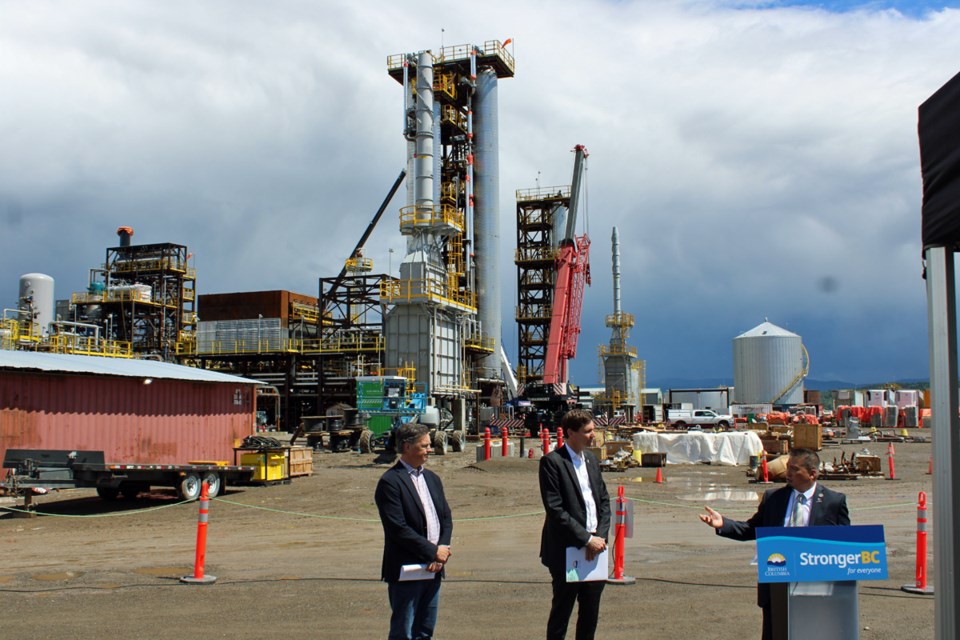Prince George’s renewable diesel refinery could shut its doors by March if ongoing issues with subsidies for American products aren’t resolved, the company’s CEO says.
On top of that, Tidewater Renewables’ Jeremy Baines told The Citizen on Thursday, Dec. 12 it would also thwart the company’s desire to build a renewable aviation fuels plant in the city near its existing operations.
In its third-quarter financial report for 2024 issued last month, Tidewater Renewables said it had lost around $367 million in that quarter alone.
The company opened its renewable diesel refinery last year with financial assistance from the provincial government on the site of the conventional refinery formerly owned by Husky Energy.
There are 165 employees split between the conventional and renewable refineries, with about one-third of workers at the latter facility.
“Basically, things were going fairly well for the first part of this year,” Baines said by phone from Calgary. “But because of, I would call it a failure of policy, we’ve got an environment where you’ve got a production-based subsidy in the U.S. and then you have a sales-based green credit availability in British Columbia and Canada."
Those subsidies on both sides of the border allow those American companies to sell their product at a rate that Baines said Tidewater can’t compete with.
“That has put extreme pressure on us,” he said. “It has really caused a significant decline in the low-carbon fuel standard credit pricing because all of the conventional refiners out of Alberta, they are importing U.S. diesel cheaply — basically dump product in our view — and using that to generate credits that help them comply with their obligation under the compliance protocol.”
To deal with the issue, Baines said the company expects to file a formal trade action against the United States by the end of the year. In the best-case scenario, he said tariffs would be applied on American products by the second quarter of 2025.
He said they’re also engaging with the provincial and federal governments on the issue.
On Monday, Dec. 9, new Prince George-Mackenzie Conservative MLA Kiel Giddens announced plans to introduce his first private member’s bill once the Legislature reconvenes.
A draft copy of that bill shared by Giddens with The Citizen shows that it would amend the Low-Carbon Fuels Act to reduce any subsidies provided by BC to renewable diesel by the same amount it receives from a government or other organization outside of the province.
It also requires the government to assess and validate the value of external subsidies and adds a definition of renewable diesel to the act.
Baines said that Giddens’ bill would help level the playing field and allow for Tidewater to become competitive, though it would depend on what form the bill takes if and when it receives royal assent and becomes law.
But if there’s no trade action or policy fix, the Prince George refinery could be living on borrowed time.
“Our renewable diesel facility relies on the (BC Low-Carbon Fuel Standard) credits, the values of those and the clean fuel regulation credits to be profitable,” Baines said.
The company entered into a purchase agreement where it sold assets to buy fuel standard credits last September.
“That agreement ends at the end of March and absent a fix at that point, we are likely done," Baines said.
It would be a shame, he said, because the refinery received provincial assistance for the capital cost of building the $450 million facility. He also said it would represent a loss of jobs for Prince George and a blow to BC’s ability to have a viable fuels industry.
What it would also do is halt the company’s plan for the future.
“We are contemplating a sustainable aviation fuel refinery as the next step in our renewable fields energy transition strategy,” Baines said. “It would be a significant investment in Prince George and would come with a significant amount of employees and economic activity.”
This facility would be on a brownfield industrial site near the current Tidewater operation. Baines said there’s an engineering and design feed study for the project under way, with the province assisting with that $15 million phase. It’s expected to be complete halfway through 2025.
Following that, the company could make its final investment decision on the project by the end of next year.
Without the renewable diesel refinery being operational, Baines said, there won’t be enough capital for that project.
On Tuesday, Dec. 10, fuel distributor Parkland announced it had produced more than 100,000 litres of low-carbon aviation fuel at its Burnaby plant with the assistance of the provincial government. This fuel is being purchased by Air Canada. The company said the fuel was made with non-food grade canola and tallow, both of which Tidewater uses to make diesel at its Prince George refinery.
By email, a spokesperson for BC’s Ministry of Energy and Climate solutions said they’ve heard from industry stakeholders about the impact of American subsidies on Canadian producers.
“As biofuel production increases so has the number of international trade disputes, and it’s clear we need a national approach to support production in Canada,” the spokesperson said.
“We’ve been working with Natural Resources Canada to ensure a fair deal for BC biofuel producers, And Premier Eby has advocated for increased support to the biofuels sector directly to the prime minister.
“The BC Conservatives ran on a plan to eliminate the (Low-Carbon Fuel Standard). That would have forced Tidewater Renewables to close, not to mention the 42 other low carbon fuel standard projects representing $2.25 billion in investments.”



